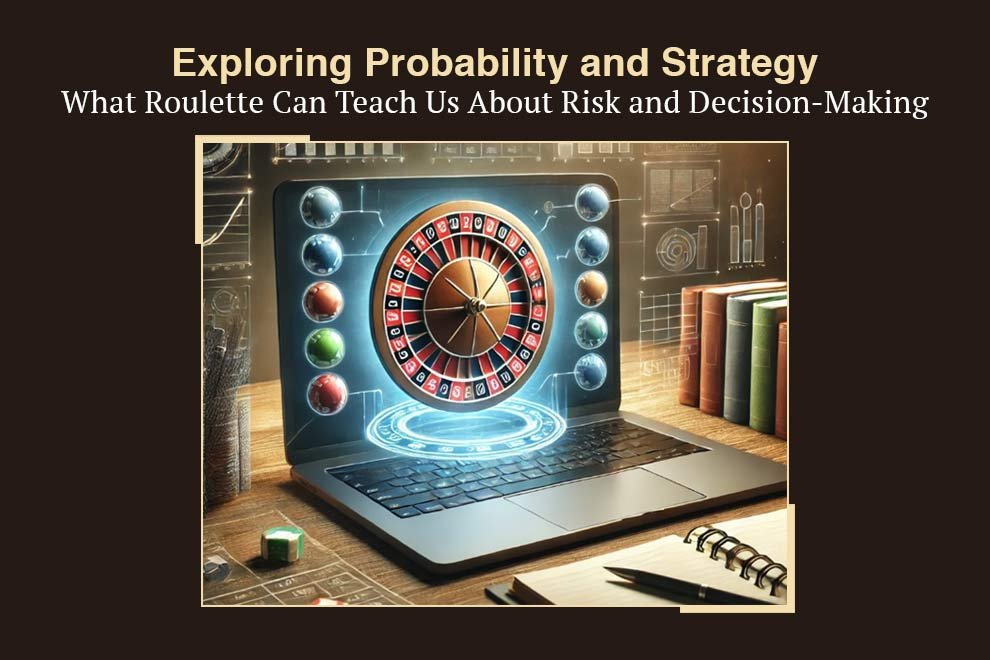At first glance, roulette might seem like a straightforward game of luck. However, behind every spin of the wheel lies a fascinating interplay of probability, risk management, and decision-making. For those curious to explore these concepts in a fun and interactive way, spin the roulette wheel with Playbet and see how the thrill of the game can also be a lesson in critical thinking.
This article takes a closer look at the educational side of roulette, from probability and statistics to the psychology of risk and strategy. Whether you’re an aspiring mathematician or simply enjoy the intellectual side of games, there’s a lot to learn from this classic casino game.
Roulette as a Window into Probability and Statistics
Probability and statistics are essential concepts in many areas of life, from predicting weather patterns to making informed business decisions. Roulette, with its numbered wheel and multiple betting options, offers a unique and engaging way to explore these principles in action.
Understanding the Roulette Wheel: Odds and Probability
The roulette wheel consists of numbered slots, and players place bets on where they think the ball will land. These options include:
- Individual Numbers: Betting on a single number has a lower probability but a higher payout.
- Color Bets (Red or Black): With nearly a 50/50 chance, this option has better odds but a smaller payout.
- Number Groupings (Evens, Odds, High, Low): These bets fall between individual numbers and colors in terms of odds and payout.
Each of these bets represents different odds, which players can calculate based on the specific type of roulette (e.g., European vs. American). As players make decisions, they start to see probability in action, experiencing how different bets carry different risks and rewards.
Strategy Meets Luck: Lessons in Risk Management
Roulette is a blend of chance and choice, with players constantly weighing risk versus reward. This balance makes it an interesting game for understanding risk management, as each spin forces players to consider the potential payout against the likelihood of success.
Exploring Risk Management Through Roulette
- Low-Risk vs. High-Risk Bets: Bets like red/black are safer but offer smaller rewards, while betting on a single number is riskier but has a high payoff. Choosing between these options is an exercise in risk tolerance.
- Setting a Budget: One of the most critical aspects of playing responsibly is managing a budget. Even in roulette, players often set limits to avoid betting more than they can afford to lose, a valuable lesson in financial planning.
- Knowing When to Stop: Roulette can be addictive, especially when luck is on your side. Learning to walk away at the right time, whether after a win or loss, teaches discipline and self-control.
For anyone interested in risk management, roulette is an accessible way to explore these concepts and see the real-world implications of different choices.
The Psychology Behind Decision-Making in Roulette
Playing roulette involves more than understanding odds—it taps into the psychology of decision-making, as players must decide when to trust their intuition, follow patterns, or stick to logic. This interplay between instinct and analysis makes roulette an engaging way to study cognitive biases and decision-making strategies.
Insights into Decision-Making from the Roulette Table
- The Gambler’s Fallacy: This is the belief that past results influence future outcomes in independent events. For example, if the wheel has landed on black five times in a row, players may believe red is “due,” even though each spin is independent. Recognizing and overcoming this bias can lead to better decision-making.
- Risk Perception: Roulette allows players to explore their own tolerance for risk. Some may prefer sticking to safer bets, while others go for high-stakes options, reflecting different personalities and risk preferences.
- Emotional Regulation: Roulette teaches players how to manage emotions, whether they’re riding the high of a win or coping with a loss. This self-awareness is valuable in many areas of life, from handling stress to managing investments.
By understanding these psychological elements, players can improve their decision-making both in the game and in real-world situations that require similar skills.
Making Probability Interactive: Tips for Getting Started with Roulette on Playbet
For those who want to experience roulette’s blend of probability, strategy, and excitement, Playbet provides a safe, engaging platform to try the game firsthand. Here’s how you can start exploring these concepts through Playbet’s live roulette options:
- Experiment with Different Bets: Begin with low-risk bets, like red/black, to get a feel for probability in action, then try higher-risk options to experience how different bets impact outcomes.
- Track Your Outcomes: Observing results over multiple rounds can give you insights into the game’s randomness and help debunk any ideas of “winning streaks” or “patterns.”
- Set a Limit and Stick to It: Decide on a budget before starting, and treat it as a learning experience rather than a way to make money.
- Observe the Dealer: In Playbet’s live roulette games, you can watch the dealer spin the wheel, bringing the atmosphere of a real casino to your screen and adding to the learning experience.
These small steps allow you to approach roulette as a hands-on study in probability and decision-making, making each spin both fun and educational.
Applying Roulette Insights to Real-Life Situations
The concepts learned from roulette can apply to various aspects of daily life, especially when it comes to decision-making and understanding probability. Here’s how some of these lessons can be valuable beyond the game:
- Financial Decisions: Just like in roulette, real-world financial choices involve balancing risk and reward, managing budgets, and setting clear limits to protect one’s resources.
- Project Management: In work or study, assessing odds and calculating risks are key skills for successful project planning and problem-solving.
- Personal Goals: Roulette teaches players to know when to push forward and when to step back, a valuable mindset for achieving long-term goals without overextending.
While roulette may be a game, the critical thinking skills, self-discipline, and awareness of cognitive biases it fosters are valuable tools in both personal and professional realms.
Conclusion
Roulette is more than just a game of chance; it’s a fun, interactive way to explore probability, strategy, and the psychology of decision-making. Platforms like Playbet make it easy to spin the roulette wheel from home, allowing players to learn about probability in action while enjoying the thrill of each spin.
For anyone interested in exploring the mechanics of probability and risk in a relaxed, engaging environment, roulette provides a perfect blend of entertainment and education. So, if you’re ready to test your knowledge and challenge your instincts, why not give it a spin?
Also Read: Data-Driven Decision-Making: Transforming Education & Gaming Through Analytics










